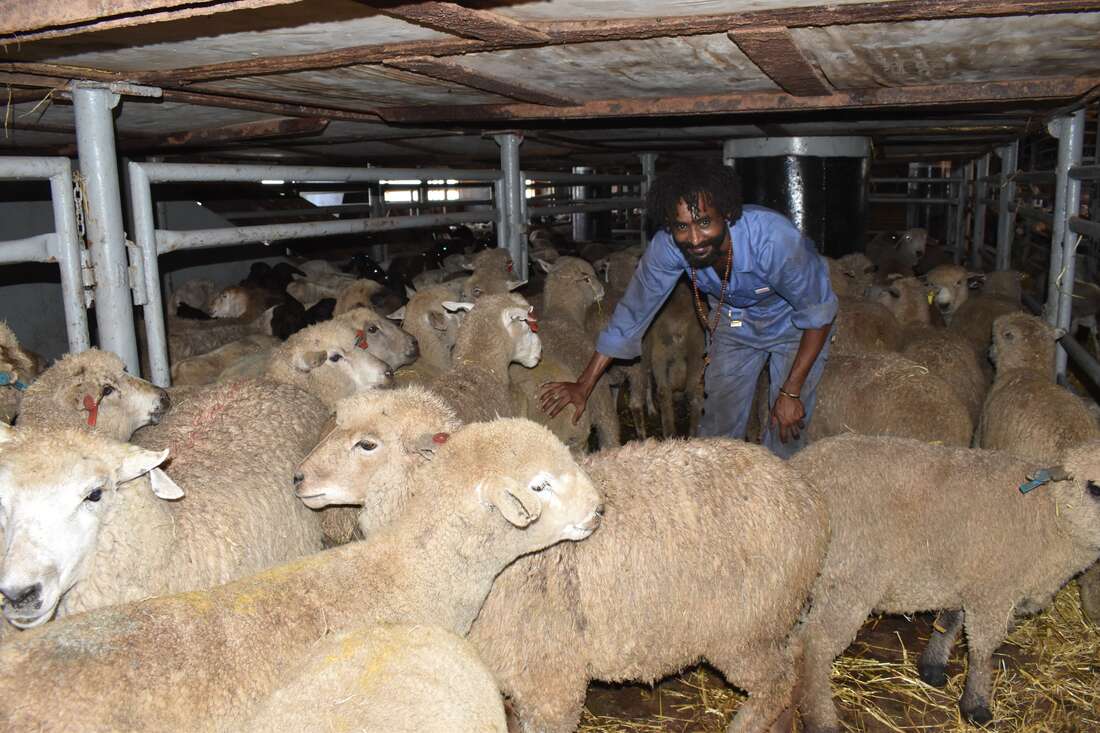MK254
JF-Expert Member
- May 11, 2013
- 31,749
- 48,361
Lengo ni kufiksha mifugo 500,000 kwa mwaka
Kenya on Monday resumed direct export of livestock to Oman after more than 16 years ban.
A ship carrying more than 14,000 goats and sheep from different livestock keeping zones left Mombasa port on Monday afternoon to Salalah Port, Oman, as the two countries agreed to boost livestock trade in the coming years.
This is the first batch of more than 40,000 livestock worth more than Ksh200 million ($1.7 million) scheduled to be exported to Oman.
Sheikh Mohammed Dor, Kenya's Ambassador to Oman, said Oman has assured Kenya that there is potential to export more than 500,000 livestock annually as the market is guaranteed.

Al Bashayer Meat Company CEO Dr Ghalib Al Saidi and Kenyan Ambassador to Oman, Sheikh Mohammed Dor, at the port of Mombasa on January 3, 2021. PHOTO | WACHIRA MWANGI | NMG
Sheikh Dor said Kenya will be exporting livestock every month to Oman and Gulf region.
“Today we resume exporting livestock to Oman and this is wonderful business opportunity apart from the on-going vibrant exports of Kenyan horticulture, floriculture, among other products,” the ambassador said in Mombasa.
Sheikh Dor said the resumption of livestock export was due to measures put in place by the Kenyan government to ensure the they are free of diseases.
“The economic blueprints of the two countries—Kenya’s Vision 2030 and Oman’s 2040 Big Four Agenda—have placed food security as a top agenda and this reverberates mutual commitment to advance trade relations,” said Sheikh Dor.
Oman’s meat commissions department CEO, Dr Al Saidi, said his team will cooperate with local suppliers to ensure there’s a steady supply of livestock to his country.
“Oman is a food hub of the Gulf region. This opportunity of livestock export is providing a win-win trading environment for both Kenya and Oman,” he said.
The Kenyan government is working with two local suppliers—Zuridi Africa and Najib's Livestock International—to collect animals across the country for export.
The livestock sector has previously been affected by the rampant cases of foot and mouth disease.
However, the government has empowered the Kenya Veterinary Vaccine Production Institute which will provide farmers with cheaper vaccines to ensure disease-free livestock for export.
The national and county governments are developing a livestock bill that will, in the long run, create registered producer associations to help livestock owners aggregate their produce and sell them in bulk so as to eliminate middle men from the value chain, and in turn maximise on profits.
Kenya has already signed a number of export agreements with countries in the Middle East to facilitate the sale of livestock products.
In the coming months, Kenya intends to use the new Lamu Port for livestock and meat exports.
The Lamu port is also ideal for livestock exports because it is closer to the key animal production areas in the Northeast part of the country.

 www.theeastafrican.co.ke
www.theeastafrican.co.ke
Kenya on Monday resumed direct export of livestock to Oman after more than 16 years ban.
A ship carrying more than 14,000 goats and sheep from different livestock keeping zones left Mombasa port on Monday afternoon to Salalah Port, Oman, as the two countries agreed to boost livestock trade in the coming years.
This is the first batch of more than 40,000 livestock worth more than Ksh200 million ($1.7 million) scheduled to be exported to Oman.
Sheikh Mohammed Dor, Kenya's Ambassador to Oman, said Oman has assured Kenya that there is potential to export more than 500,000 livestock annually as the market is guaranteed.

Al Bashayer Meat Company CEO Dr Ghalib Al Saidi and Kenyan Ambassador to Oman, Sheikh Mohammed Dor, at the port of Mombasa on January 3, 2021. PHOTO | WACHIRA MWANGI | NMG
Sheikh Dor said Kenya will be exporting livestock every month to Oman and Gulf region.
“Today we resume exporting livestock to Oman and this is wonderful business opportunity apart from the on-going vibrant exports of Kenyan horticulture, floriculture, among other products,” the ambassador said in Mombasa.
Sheikh Dor said the resumption of livestock export was due to measures put in place by the Kenyan government to ensure the they are free of diseases.
“The economic blueprints of the two countries—Kenya’s Vision 2030 and Oman’s 2040 Big Four Agenda—have placed food security as a top agenda and this reverberates mutual commitment to advance trade relations,” said Sheikh Dor.
Oman’s meat commissions department CEO, Dr Al Saidi, said his team will cooperate with local suppliers to ensure there’s a steady supply of livestock to his country.
“Oman is a food hub of the Gulf region. This opportunity of livestock export is providing a win-win trading environment for both Kenya and Oman,” he said.
The Kenyan government is working with two local suppliers—Zuridi Africa and Najib's Livestock International—to collect animals across the country for export.
The livestock sector has previously been affected by the rampant cases of foot and mouth disease.
However, the government has empowered the Kenya Veterinary Vaccine Production Institute which will provide farmers with cheaper vaccines to ensure disease-free livestock for export.
The national and county governments are developing a livestock bill that will, in the long run, create registered producer associations to help livestock owners aggregate their produce and sell them in bulk so as to eliminate middle men from the value chain, and in turn maximise on profits.
Kenya has already signed a number of export agreements with countries in the Middle East to facilitate the sale of livestock products.
In the coming months, Kenya intends to use the new Lamu Port for livestock and meat exports.
The Lamu port is also ideal for livestock exports because it is closer to the key animal production areas in the Northeast part of the country.

Kenya resumes export of livestock to Oman after 16 year-ban
The export deal came after Kenya took measures to ensure the livestock are disease-free.